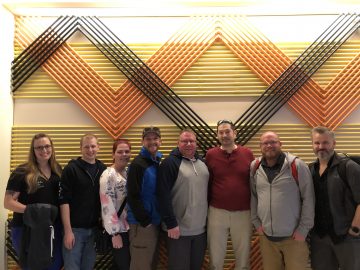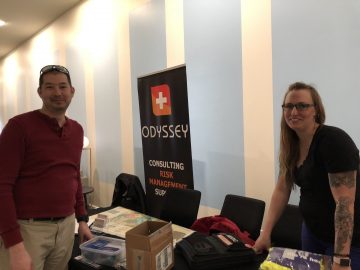
An interested group of mass gathering medicine folks travelled to Las Vegas in March 2019. We met with colleagues from across North America to discuss and debate issues related to mass gatherings.
Adam Lund facilitated a panel on “Who Owns Event Medicine?” Each person on the eight person panel adopted a different, extreme position and argued why their profession was the most important decision maker at the table. The debate provided conference attendees with a great chance to consider the multitude of stakeholders and the perspectives they bring to the table with a focus on common interests and goals.
Sheila Turris hosted a panel on Festival Health. Experts from Indigo, DanceSafe, and others shared their expertise in providing peer support and access to education for attendees of music festivals. Conference participants had a chance to pose challenging questions and to debate answers. A short summary is provided below.
Major Themes
- Spreading the Word.The importance of language was brought home, throughout the Summit. “Harm reduction” is a phrase with history. Sometimes that history works in our favor and sometimes it doesn’t. I was actually surprised at how few people from health care professions understood harm reduction. There is a lot more work to be done in terms of educating producers and other stakeholder groups about the ways in which embedding a strong harm reduction team will change guest experiences of music festivals.
- Moving In From the Margins. We all know the value of harm reduction work. We see it every time we step into a festival health space. We have to be able to explain that value to stakeholders – starting with event producers and on-site medical teams. Collecting good data will help us quantify, qualify, and explain value to external groups. If the harm reduction community (for music festivals) can align on essential data points and combine resources, this could move harm reduction services to the centre, with participation in event planning, full integration, and reasonable budgets.
- Strengthening Collaborations.Event medical teams and harm reduction teams share many common goals. One of the things that gets in the way of collaboration (if I understood the comments from our audience) is that there are currently no clear, consistent certifications or curriculums for harm reduction professionals. I think this will continue to evolve and in fact, the professionalization of harm reduction (as it relates to music festivals) may be upon us. In the meantime, I remain confident that the “solution” is not an either/or (i.e., either grass roots OR professionalization), but rather a both/and. I know that medical and festival health services can be integrated so that each team is supported to do their best work.
